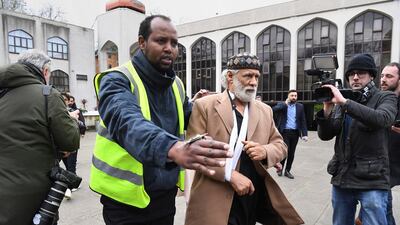A prominent muezzin has returned to the mosque in central London less than 24 hours after he was stabbed.
Raafat Maglad, 70, visited the London Central Mosque in Regent's Park on Friday, with his arm in a sling and flanked by security.
Mr Maglad was taken to hospital after the stabbing but was discharged from hospital on Friday morning.
He said he felt "lucky" the knife had missed his jugular vein.
"I was closing my eyes to pray and put down my head. It felt like someone hit me with a brick. It was terrible, there was so much blood," he told the Evening Standard.
"I put my hand up and tried to close the cut. Everyone stopped him and called the ambulance. I feel lucky. It could have cut my jugular and I would have had no chance."
Mr Maglad told the BBC at the mosque that he forgave his attacker.
He was joined by Mayor of London Sadiq Khan.
Worshippers at the mosque spoke of the fear and confusion that followed his shock stabbing during prayers on Thursday.
Afternoon prayers at London Central Mosque, close to Regent’s Park, ended almost as soon as they began when a 29-year-old man, posing as a worshipper, lunged at Mr Maglad from behind with a knife.
The muezzin was stabbed in the shoulder, close to his neck. In the moments after the stabbing he was rushed to the hospital. His injuries are not believed to be life threatening.
Abdulsalam Watik, a 59-year-old worshipper, told The National there had been chaos in the mosque during the 30 seconds that the attack took place.
“The guy was behind him and he came up with a knife,” he said. “Then we heard screams — we didn’t know what had happened.”
‘He was waiting for us before it started,’ he said.
The knifeman had laid in wait for prayers to begin before launching his attack. The muezzin had “lots of blood” pouring from a wound in his shoulder, Mr Watik explained.
However, another member of the congregation was able to quickly intervene and wrestle the attacker to the ground. The small kitchen knife he had used, five inches long, fell to the ground.
Mr Maglad was still able to talk following the ordeal, as worshippers applied first aid, stemming the flow of blood from the wound.
Emergency services quickly arrived at the scene. Mr Watik claimed he had seen the attacker multiple times at the mosque over the last six months. He was arrested at the scene on suspicion of attempted murder after worshippers moved to pin down the suspect.
Chief superintendent Helen Harper believed it to be “an isolated incident” and was not treating it as terrorism related. No other suspects are being sought at this time, she said.
Later in the day following the attack and as evening prayers drew closer, the iron gates of the mosque were firmly closed.
Security guards in high-visibility jackets only opened the doors for police officers and a few members of the community. Inside, in the mosque’s central courtyard overlooked by a minaret, police spoke with witnesses.
Only a few worshippers lingered outside speaking to the press.
Walid Mohammed, a 39-year-old worshipper, questioned the state of security at the mosque in the wake of the attack.
“This certainly wasn’t the first time someone has been attacked here and it won’t be the last,” he said. “They should be looking at people for security. Any good worshipper wouldn’t mind being asked some extra questions.”
Mr Mohmmed also spoke of Mr Maglad as a pillar of the community. “I personally know Rafaat. He’s genuinely a softly spoken person. He’s someone everyone would say hi to.”
“If that could happen to such a lovely man — perhaps we all have to watch our backs when we’re here to pray,” he added.
London interfaith leader Mustafa Field said he hoped the case was not linked to extremism. “On this occasion we are yet to know what has actually happened,” he said. “Last week we had Britain First threatening mosques in northern Britain.”
“The community in London wants to show that they care and will not be divided,” Mr Field added.


